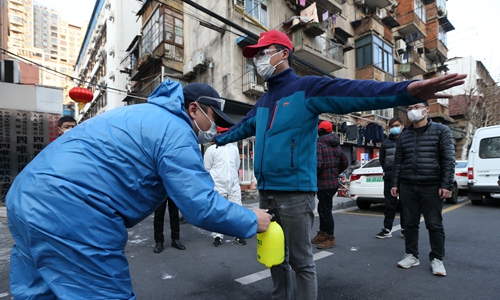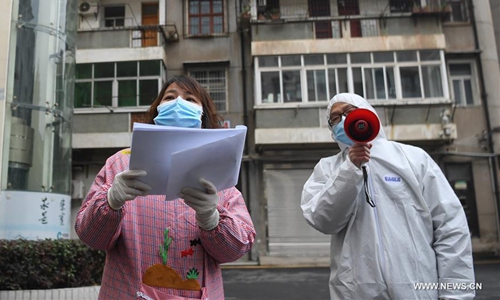HOME >> CHINA
Wuhan revokes easing control
By Zhang Han and Leng Shumei Source:Global Times Published: 2020/2/24 16:38:08
Withdrawal shows situation is still tense: expert

A community service employee sprays disinfectant on a local resident on Wednesday in Wuhan, Central China's Hubei Province, which is also the epicenter of the COVID-19 outbreak. The city government has launched door-to-door visits of every household and imposed strict quarantine measures in residential communities. Photo: Cui Meng/GT
Authorities in Wuhan, Hubei Province, retracted an announcement only three hours after its publication that said it would ease the city's lockdown to allow certain residents to leave and those outside to enter, as the COVID-19 outbreak epicenter has been sealed off for 31 days.Experts welcomed the decision to withdraw the easing of the policy, saying it shows the epidemic situation in Wuhan still doesn't allow for over-optimism.
The previous notice was released on Monday morning, stating that people stranded in Wuhan can leave the city if they are not under medical observation or required to undergo quarantine. Wuhan residents who need to leave for work involving epidemic control, industrial production and treatment of special diseases can also leave the city.
The notice prompted widespread discussions immediately after its release, with many wondering whether it would be too early to relax control on human activities amid the epidemic fight.
However, the city's epidemic prevention and control command center on Monday afternoon retracted the notice saying it was released without careful research or approval from senior officials.
According to Taoranbiji, a media account on WeChat, the retracted notice was issued by a deputy mayor of Wuhan.
Yang Zhanqiu, deputy director of the pathogen biology department at Wuhan University, said the withdrawal is a safe decision as the epidemic control situation in the city does not allow relaxation at this moment.
Partly lifting the travel ban would misguide the public, leading them to believe that the epidemic situation in Wuhan is already fine, Yang told the Global Times on Monday.
"There are still hundreds of new confirmed cases every day. The notice, if implemented, means that people can not only leave, but also get into Wuhan, which means control over infection sources is not guaranteed," Yang noted.
Ren Jianming, an associate director of the Research Center for anti-corruption and governance at Tsinghua University, agreed with Yang, criticizing the Wuhan government's eagerness and lack of awareness of the overall situation of the epidemic in issuing and retracting the notice within hours given the central government and epidemiologists' reiteration of the warning that it is still too early to relax in the battle against the epidemic.
The epidemic's social and economic effects are impacting the whole country and even the world, Ren told Global Times on Monday.
As for when a lift of the lockdown can be announced, the timing should be approved not only by the city government, but also the provincial and central authorities, given the epidemic's massive impact on the country, according to Ren.

Community workers learn about residents' situation in Caidian District of Wuhan, central China's Hubei Province, Feb. 7, 2020. Wuhan, the epicenter of the novel coronavirus outbreak, is combing communities to ensure every confirmed or suspected patient is located and attended to. (Xinhua/Cheng Min)
Wuhan reported 348 new confirmed cases on Sunday, with 35,674 cases under treatment. Fifty new cases were reported in other cities in Hubei Province. The number of new infections in Wuhan stayed at a few hundred in the past five days in comparison with more than 1,000 a day previously.Despite some positive signs, Chen Xi, assistant professor at Yale University's School of Public Health, said that it was too early to ease the lockdown.
The base number of confirmed and suspected cases is still large and there are 8,329 patients in critical condition in Wuhan, and if the virus is resurrected in and outside the epicenter, the situation will become very thorny, Chen said.
Ren noted that given the hundreds of new cases reported in the city every day, human-to-human transmission still exists.
There are possibly still people infected with the novel coronavirus who have not been found, he said.
Inside Wuhan city, it is difficult to say that everything is in order while returning to normal seems impossible at the moment.
Some Wuhan residents reached by the Global Times said that delivery of daily necessities has been problematic after all residential compounds were sealed off. "The vegetable package is quite expensive and sometimes we did not receive items we ordered, without explanation," a local resident surnamed Liu told the Global Times.
A local doctor who requested anonymity told the Global Times that some close contacts of patients and suspected cases were not cooperative in infection screening, which posed the danger of human-to-human transmissions on a small scale.
Posted in: SOCIETY,CHINA FOCUS